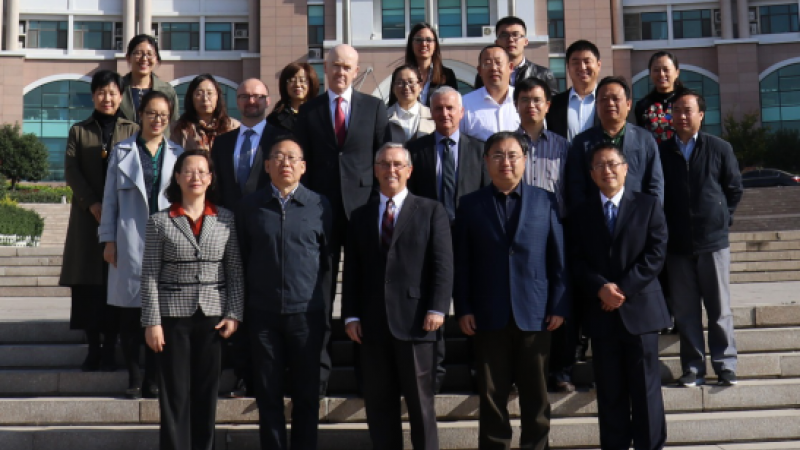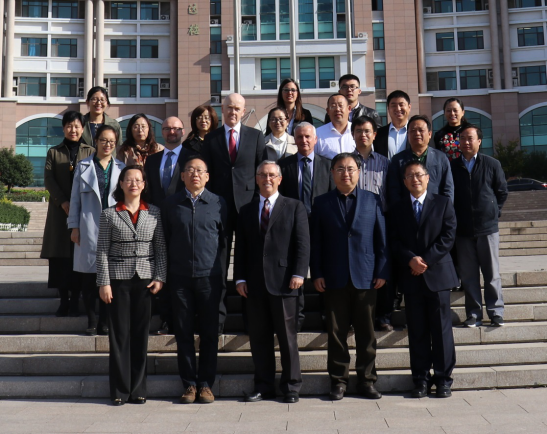Report of the UNSW Canberra visit to Qingdao (China) and Jiaozhou Bay research workshop, 23 October 2017

Report of the UNSW Canberra visit to Qingdao (China) and Jiaozhou Bay research workshop, 23 October 2017
The day started with the 7th Advisory and Management Committee of the Sino-Australian Research Consortium for Coastal Management (SARCCM) and the Workshop on “Ecohydrology modelling of Jiaozhou Bay under climatic and anthropogenic scenarios”. Both events were held at the Administration Building of the Ocean University of China (OUC) and counted with participants from SARCCM, UNSW Canberra, OUC, Yantai Institute of Coastal Zone Research (YIC) of the Chinese Academy of Sciences (CAS), Shandong Tongda Marine Science and Technology Co. Ltd and Shanghai Rainbowfish Ocean Technology Co., Ltd.
Prof Wenhong Song, Director of the OUC International Office, welcomed the UNSW delegation and opened the meeting. Then, A/Prof Xiao Hua Wang, SARCCM Director, introduced the UNSW SARCCM annual report highlighting the establishment of new collaborations, the achievement of grants and funds, and the setting up of the UNSW-OCU double master degree program. All attendants expressed strong support to ongoing and future collaborations and a group photo followed.

The workshop on “Ecohydrology modelling of Jiaozhou Bay under climatic and anthropogenic scenarios” hosted four talks about recent research but also future projects on Jiaozhou Bay (NE China). Firstly A/Prof Dehai Song (OUC) provided an overview of Jiaozhou Bay integrated research and Dr Guandong Gao (IO/CAS) explained the wave-current interactions on sediment dynamics in this bay. Both presentations highlighted the major advances in hydrodynamic modelling in Jiaozhou Bay, as well as future steps to reach a better understanding of ecological and physical processes of the bay. The meeting continued with one of the most critical contemporary environmental issues, the marine pollution of microplastics. Dr Yanfang Li (YIC) introduced the subject with a talk about microplastics distribution and transport in the nearby Bohai Sea. Then, Dr Isabel Jalón-Rojas (UNSW Canberra) presented a research project to study microplastics transport and destination in small embayments, in particular in Jervis Bay (SE Australia) and Jiaozhou Bay. This project generated a strong interest and opened different collaboration channels between UNSW Canberra, OUC and YIC.

In the afternoon, UNSW delegation visited the Torch partner Shandong Tongda Marine Science and Technology Co. Ltd, in order to discuss Torch collaborations including Jiaozhou Bay microplastics field and lab experiments. Discussions continued over lunch, hosted by the Director of the Torch partner Mr Xiao Liu.

At a meeting at OUC Loashan campus, UNSW delegation met the Dean of GRS of OUC Prof Shi Hongda to discuss the UNSW-OUC CSC program, the Double Master Degree program and Joint PhD program. Discussion mainly focused on the procedure to set up Joint PhD program so that students will get the PhD certificate from two institutions based on a single thesis. A joint academic committee between two Universities will be established to develop this joint program aiming to start in 2019.

As a closure of the day, the Associate Dean International of the UNSW Canberra introduced China Scholarship Council (CSC) scholarships, UNSW Canberra PhD scholarships and the Double Master Degrees program to potential students. More than one hundred OUC students attended this meeting and showed great enthusiasm and interest for these programs. Then, students had the opportunity to make inquiries one-on-one to UNSW members as well as to old UNSW students who became OUC professors. This consultation session extended more than one hour and left very good feelings to both professors and students. All the discussion performed during this long day were consolidated over dinner, hosted by the Director of the OUC International Office Prof Wenhong Song.


